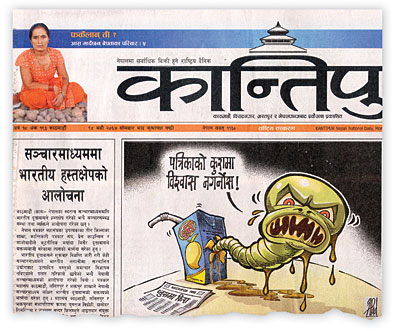 |
The influence of the Indian Embassy in the internal affairs of Nepal has always been felt. Now it can be heard and seen as well. Clearly, Lainchaur does not believe in diplomatic niceties in exercising political control in a notionally independent nation.
The pressure exerted on the foreign ministry by the Indian diplomatic mission led to delay of the the Machine Readable Passport (MRP) deal. Though the printing contract was initially awarded to a company owned by the Government of India, the subsequent fiasco finally ended with the cancellation of that contract.
The verity of the accusations that former lawmaker Ram Kumar Sharma levelled against an Indian embassy official has not been established. But the perception is that Sharma may well have been threatened as alleged.
Now the tussle between Kantipur Group and Lainchaur has just got dirtier. In the first part of the drama, the embassy persuaded Indian nationals heading businesses in Nepal to throttle the advertisement pipeline of Kantipur Publications. When this failed to have the desired effect, non-tariff barriers to trade were used to starve the publishing house of newsprint supply.
The third episode began with a terse embassy press release on 27 August charging the Nepali media with using slanderous coverage to elicit commercial advantage. The statement was not only undiplomatic and politically incorrect, but also insulting. Paid news is not unknown to the Indian media; theTimes of India sells its loyalty openly to the highest bidders through what it calls 'private treaties'. Prominent media organisations were justified in demanding an apology from the Indian mission, particularly after a second and even more belligerent statement was released.
The fundamental premise of these press releases is flawed. The Indian joint ventures are legal entities in Nepal. They are expected to approach law enforcement agencies if they have any complaints. The law does not offer them any special privileges just because they are Indian. They have crossed the limits of decency by approaching a foreign embassy for what was essentially a difference of opinion or dispute between some Nepali advertisers and the national media.
Indeed, when approached with such grievances, the embassy should have recommended that the offended party either register complaints with the Press Council, the police, or the courts. The Nepal India Chamber of Commerce and Industry (NICCI) could also have been asked to intervene. The NICCI did place a notice in newspapers calling for restraint on all sides on Wednesday, but it was clearly a case of too little, too late.
Diplomats need to realise that Nepal-India ties are fraught with potential misunderstanding. India may not be the superpower it aspires to be yet, but it is a giant that India-locked Nepal can ill afford to ignore. This helplessness in the face of India's might has rankled every ruler in Kathmandu from the time of Chandra Shamsher. Indian officialdom hasn't yet realised that with great power comes great responsibility, and playing upon the vulnerability of Nepalis is counterproductive.
It is not the responsibility of the Indian Embassy in Kathmandu to foist a code of ethics on Nepali journalists. But the Press Council is embroiled in a controversy with the Ministry of Communication, and is dysfunctional at present. Various other media forums probably realise that whatever is being reported about certain Indian-owned joint ventures may not be above board. But meddlesome statements from the Indian mission have made their task, of monitoring the activities of their colleagues, almost impossible.
READ ALSO:
The centre cannot hold, PUBLISHER'S NOTE
Nitty-gritty politicking, PRASHANT JHA
Singing of sorrow, INDU NEPAL
If the cap fits, ASHUTOSH TIWARI



